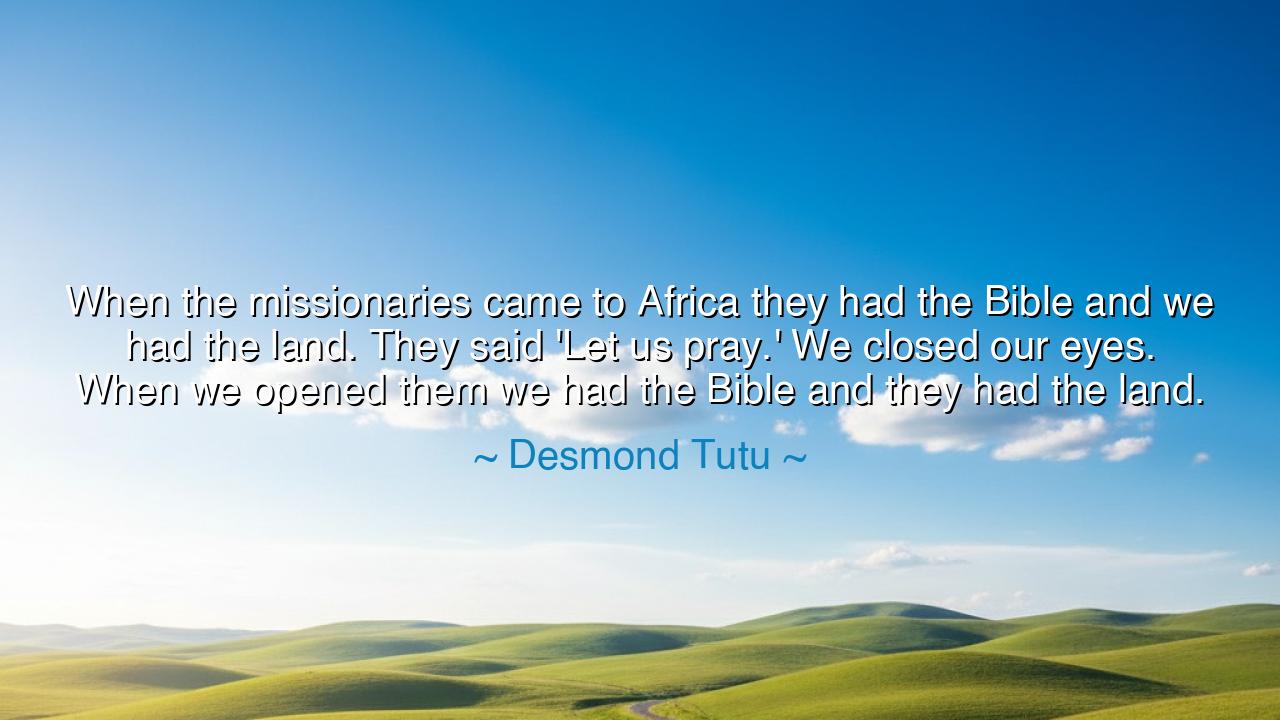
When the missionaries came to Africa they had the Bible and we
When the missionaries came to Africa they had the Bible and we had the land. They said 'Let us pray.' We closed our eyes. When we opened them we had the Bible and they had the land.






"When the missionaries came to Africa they had the Bible and we had the land. They said 'Let us pray.' We closed our eyes. When we opened them we had the Bible and they had the land." Thus spoke Desmond Tutu, the archbishop of peace, the prophet of reconciliation, and the voice of a continent that had known both suffering and resurrection. In these words, heavy with irony and wisdom, he did not mock faith, but revealed the wound of history—the way that religion, once a bearer of light, was wielded as a weapon of conquest. This quote is not only a lament, but a mirror; it reflects the tragedy of colonization and the misuse of faith to justify the robbery of dignity, land, and freedom. It is also a call to awaken, to see with open eyes, and to remember that the divine must never again be used to chain the souls it was meant to set free.
The origin of this quote lies in the heart of Africa’s long encounter with European colonization. In the nineteenth century, missionaries came in ships bearing crosses, Bibles, and the promise of salvation. They came with words of peace on their lips—but behind them marched soldiers, merchants, and kings who sought gold, ivory, and dominion. The Bible became both a comfort to the oppressed and a cloak for the oppressor. Where once the African stood rooted in the soil of his ancestors, proud of his traditions and reverent toward the earth, he was taught to bow his head and forget his power. In this image of “closing the eyes,” Tutu captures not merely a moment of prayer, but a moment of blindness—when trust was betrayed and faith was turned into a tool of subjugation.
Yet, Tutu’s genius lies in his balance of truth and grace. Though he spoke these words with the fire of justice, he never turned them into bitterness. He knew that the wound must be exposed before it can be healed. The Bible itself, he understood, was not the enemy—it was the misuse of it that poisoned nations. Tutu, like his teacher Jesus Christ, believed in the power of redemption. The same book that had been used to justify oppression would become, in his hands, the weapon of liberation. With its pages, he preached forgiveness, equality, and the sacred worth of every soul. For him, the Bible was not a colonizer’s tool—it was a revolutionary text that proclaimed freedom to the captives and justice for the poor.
To understand the depth of this truth, look to the story of Nelson Mandela and Desmond Tutu in the days after apartheid. South Africa was a nation scarred by racial division, its people burdened by decades of injustice. Yet when freedom came, the call was not for vengeance, but for reconciliation. Under Tutu’s leadership, the Truth and Reconciliation Commission was born—a place where victims could tell their stories, and oppressors could confess their crimes. The same faith that had once been used to enslave now became the power to forgive. The eyes that had been closed in forced prayer were opened again—this time not in darkness, but in light.
Tutu’s quote, then, is not simply about the loss of land—it is about the loss of innocence, the betrayal of sacred trust. It is a warning against those who use religion as a mask for greed and domination. But it is also a lesson in spiritual awakening: that the true God does not dwell in the hands of conquerors, but in the hearts of the oppressed. When people awaken to this truth, no empire can hold them. For though land can be stolen, and wealth can be plundered, the soul that has awakened to divine truth cannot be conquered.
His words also speak to all ages, not just Africa’s past. For in every time and place, there are those who “pray” while others close their eyes—those who exploit trust, those who trade truth for power. Whether in religion, politics, or commerce, the same danger lurks: that noble words can conceal ignoble deeds. Tutu calls us to vigilance—to pray with eyes open, to live with awareness, to see clearly where faith ends and manipulation begins. The lesson is clear: do not surrender your spirit blindly to any voice that claims authority in the name of God; rather, seek the God who liberates, not the one who enslaves.
So, my listener, take this teaching into your heart. Faith must never be blind. Let your eyes remain open when you pray—open to injustice, open to truth, open to the divine image in every soul. Use your faith not as a comfort that numbs you, but as a fire that moves you to act. Build a world where religion heals, not divides; where belief uplifts, not oppresses; where prayer opens the eyes of the heart, not closes them in fear.
For in the end, Desmond Tutu’s wisdom stands as both remembrance and rebirth. He shows us that even when faith is stolen and used for harm, its true power endures. The Bible that once justified conquest now calls for compassion; the land that was taken can yet be restored through justice; and the people who once closed their eyes can awaken again to the radiant truth—that God is not the property of the powerful, but the friend of the humble, and that the spirit of freedom is the holiest prayer of all.






AAdministratorAdministrator
Welcome, honored guests. Please leave a comment, we will respond soon